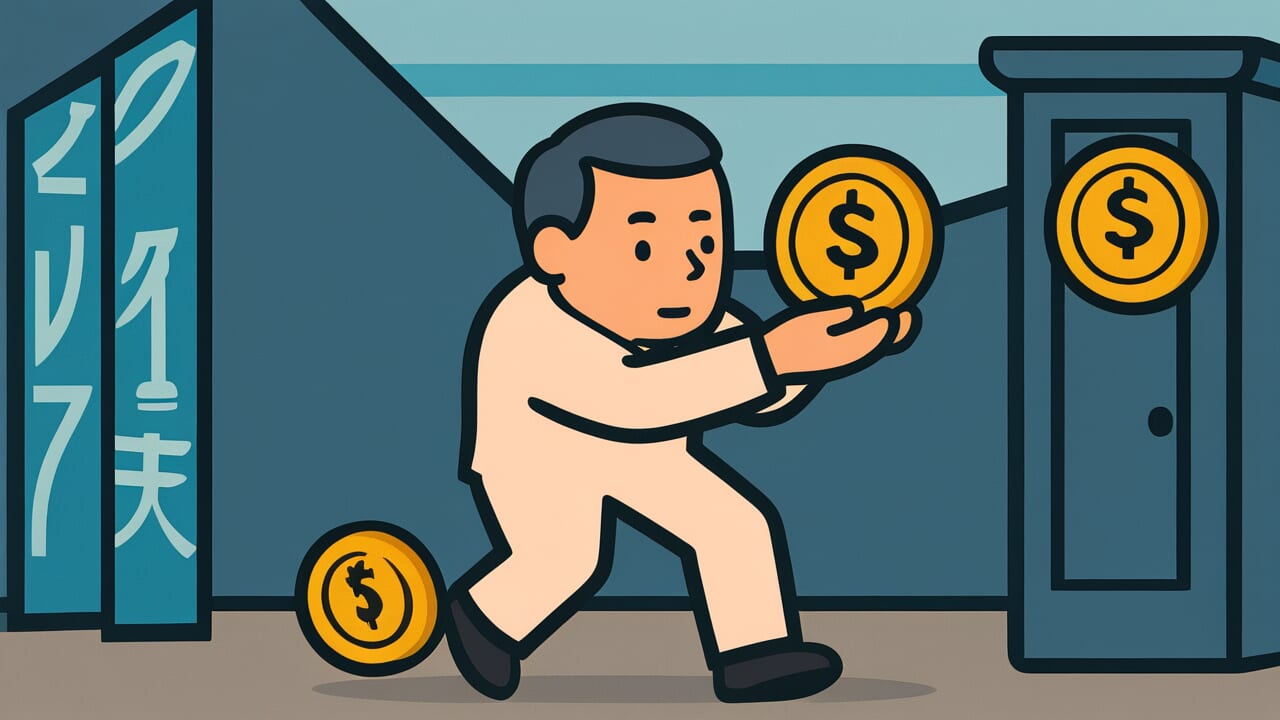How to Read “A thousand ryō behind, one mon in front”
Ushiro senryō mae ichimon
Meaning of “A thousand ryō behind, one mon in front”
This proverb shows a contradiction in human psychology. People treat warnings and preparation as almost worthless before something happens.
But after they fail, they feel their regret is worth a thousand ryō.
When someone warns you to “be careful” before trouble strikes, most people ignore it. They think the advice is worth only one mon, basically nothing.
However, after failure or loss actually happens, they regret deeply. They think “I should have prepared” or “I should have listened to that warning.”
Suddenly, that regret feels worth a thousand ryō.
We see this psychology today too. Someone might ignore advice to get a health checkup because it seems like a hassle.
But after getting sick, they deeply regret not going. “I should have gotten checked back then,” they think.
This proverb warns us about this essential human tendency. We avoid small efforts beforehand, then suffer from huge regrets afterward.
Origin and Etymology
No clear written records explain the origin of this proverb. However, we can make interesting observations from how the words are structured.
The extreme contrast between “a thousand ryō” and “one mon” forms the heart of this saying.
During the Edo period, a thousand ryō was an unimaginable fortune for common people. One mon, on the other hand, was the smallest unit of currency.
It was considered almost worthless. By contrasting these two amounts, the proverb vividly expresses the contradiction in people’s values.
The contrast between “behind” and “in front” on the time axis is also important. Behind means after something happens.
People feel their regret after an event is worth a thousand ryō. In front means before something happens.
People feel that caution and preparation beforehand are worth only one mon. The proverb cleverly expresses this strange human psychology using money, a measure everyone understands.
The Edo period saw commercial development and the spread of money sense among common people.
Against this background, expressions comparing human behavior patterns to monetary amounts likely emerged.
The human tendency to neglect preparation beforehand and place great value on regret afterward seems unchanging across time.
Usage Examples
- When told to back up my data, it seemed like a hassle. But now that my data is gone, I truly understand “A thousand ryō behind, one mon in front”
- When I heard about insurance, it seemed wasteful. But when trouble came, I realized this is exactly what “A thousand ryō behind, one mon in front” means
Universal Wisdom
“A thousand ryō behind, one mon in front” reveals a fundamental distortion in how humans perceive time.
We react sensitively to concrete losses or gains right in front of us. But we are surprisingly insensitive to future possibilities.
Why do people behave this way? Future dangers are abstract and don’t feel real.
But events that have already happened are painful realities. Preparation beforehand definitely costs time and effort.
Yet its effect only appears as “nothing happened.” Regret, on the other hand, shakes our hearts powerfully as an emotion.
This psychology may have formed through evolution. Reacting immediately to danger right in front of us directly relates to survival.
But thinking too much about distant future risks can slow down our actions in the present moment.
However, in complex modern society, this instinctive tendency ends up making us suffer.
Our ancestors saw through this human nature. That’s why they used the extreme contrast of a thousand ryō and one mon.
They vividly showed the inversion in our value judgments. This proverb has been passed down for so long because it contains a deep understanding of humanity that transcends time.
When AI Hears This
When we think about how information spreads using physics, surprising facts emerge.
Imagine ink dropped into a glass of water spreading throughout. Returning that ink to a single drop is theoretically possible.
But in reality, it requires enormous energy. This is the second law of thermodynamics, the law of increasing entropy.
The deterioration of reputation in human relationships has exactly the same structure.
For example, suppose you make one careless remark. That information first reaches one person’s ears.
Next it spreads to three people. If each of them tells three more people, it reaches nine.
In just three stages, the information has spread twenty-seven times. To reverse this exponential spread, you need to explain individually to each person and clear up the misunderstanding.
In other words, spreading information requires one action. But collecting it back requires as many actions as it has spread.
In physics, the energy to gather scattered molecules is proportional to the square of the degree of scattering.
The amount “a thousand ryō” precisely expresses this asymmetry. For the cost of one mon of forward attention, backward processing literally requires a thousand times the energy.
This is a numerical expression of information’s irreversibility.
Lessons for Today
This proverb teaches modern people the need to consciously change how we perceive value.
We instinctively place value on visible results and emotional pain. But what’s truly important is quiet preparation beforehand that works effectively.
Specifically, we need to consciously find value in investments that don’t show immediate effects.
These include insurance, health management, maintaining relationships, and acquiring skills. The ability to recognize the value of “nothing happening” is a condition of mature adulthood.
In your daily life, is there something you keep putting off? Does it really have only one mon of value?
Perhaps it’s an irreplaceable move that will prevent a thousand ryō of regret in the future.
What matters is anticipating the pain of regret through imagination. Make choices now that your future self will thank you for.
When you can do that, you transcend the constraint of time and live wisely.



Comments